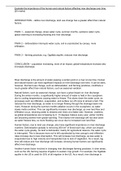Evaluate the importance of the human and natural factors affecting river discharge over time
[20 marks]
INTRODUCTION – define river discharge, land use change has a greater effect than natural
factors.
PARA 1 – seasonal change, slows water cycle, summer months, quickens water cycle,
global warming is increasing flooding and river discharge.
PARA 2 – deforestation interrupts water cycle, soil is unprotected by canopy, more
infiltration.
PARA 3 – farming practices, e.g. Ogallala aquifer, reduces river discharge.
CONCLUSION – population increasing, more of an impact, global temperature increase also
increases discharge.
River discharge is the amount of water passing a certain point in a river at one time. Human
and natural factors can have significant impacts on river discharge over time. It can be seen,
however, that land use change, such as deforestation, and farming practices, contribute a
much greater effect than natural factors, such as seasonal variation.
Natural factors, such as seasonal change, can have a great impact on river discharge.
During the winter months, a significantly higher amount of water is held in the cryosphere
due to cooling temperatures causing water to freeze. This slows down the water cycle, as
processes such as infiltration, evaporation, and surface run off come to almost a halt. This
reduces the river discharge, as water is no longer flowing through the drainage basin into
rivers. However during the summer months ablation occurs in the cryosphere, so water
slowly melts overtime. This can significantly increase river discharge, as over land flow and
infiltration occur, returning water to streams and rivers at a faster rate. However, overtime,
as global temperatures are increasing by 0 .13 degrees Celsius every year, winter months
are becoming warmer from global warming. This means river discharge will not slow down
as water freezes less, so more flooding can occur due to increased over land flow.
Human factors, due to land use change, also have significant importance on river discharge
overtime. Deforestation globally is removing 200 km2 of forest each day, which can impact
the water cycle greatly. As land is deforested, mainly for agricultural reasons, the water cycle
is interrupted. This is because more soil is left unprotected by tree canopy's and infiltration
rates increase due to less interception. This will increase river discharge, as less water is
evaporated due to high velocity and transpirated due to lack of vegetation. As a result, lag
time will reduce and river discharge will increase, showing human factors can significantly
affect river discharge.
Another human factor involved in changing river discharges farming practises. In drier areas,
such as the US, farming requires irrigation to sustain crop growth. For example, the Ogallala
aquifer in the US is used for 30% of all irrigation in the US. As a result, river discharge is




